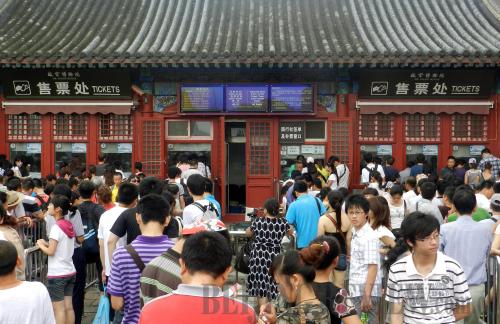|
 |
|
OVER CROWDED PALACE: The Palace Museum sees up to 100,000 visitors a day on public holidays, therefore controls on visitor numbers and effective management are needed to protect the heritge site (XINHUA) |
Yantai University in east China's Shandong Province was recently caught renting private rooms to students at the school's library. Students had to pay 60 yuan ($9.2) a month for the use of the small booths. After the media reported on the charge, the university later announced that it would abolish the fee and the booth would once again be open to students free of charge. Fees that had been collected were returned to students.
Although in this case the fee has been abolished, the incident is an indication of a wider problem—universities' eagerness for money. Students have already paid enough tuition fees to schools and thus they should enjoy free access to any public resources on the campus, including libraries.
Expanded student enrollment has squeezed universities' public resources. More and more students are competing for limited and even shrinking education resources. That's why in spite of high tuition fees, school services have begun to wither.
Libraries are symbols of social progress, particularly in universities, where they are regarded as cultural landmarks, supposed to showcase civilization and equality. Although the library in question has stopped charging fees, universities' impulse for profits remains a common problem.
Beijing Times
The Beijing Municipal Commission of Tourism Development announced at a recent press conference that during the National Day holiday (October 1-7), the Palace Museum will issue a maximum of 80, 000 tickets a day.
On average the attraction receives 30,000 tourists a day and 80,000 is regarded as the maximum number it can accommodate. In recent years, visitors to the Palace Museum during holiday periods could hit 100,000 a day. Such high visitor numbers can cause serious damage to this precious heritage site. Thus, it's timely that a limit on visitor numbers is being imposed.
However, protecting the heritage site is more important than a visitor limit. In the past, tourists were asked to wear soft-soled shoes to prevent damage, but today the Palace Museum is being trampled by hard-soled shoes day after day.
For a point of comparison, let's have a look at what's happening at the Palace Museum in Taipei. Tourists are asked to speak in low voices while tour guides speak quietly through transmitters so that tourists can hear them on earphones. In Beijing, what we always see are noisy crowds. This striking contrast demonstrates that while limiting tourist flow is only a temporary measure for a short period, good maintenance work is a more important, effective and long-term investment.
Xinmin Evening News
Some governmental departments in east China's Zhejiang Province have established an agricultural base in Suichang County in the province. The area's excellent ecological environment ensures these departments can get safe organic agricultural food.
However, the produce from this area is consumed and distributed internally—within these departments, and ordinary consumers have almost no access to such safe food. Green agricultural bases were originally supposed to serve the public, but increasingly they are serving small, privileged groups .
The excess use of pesticides and additives now poses a serious threat to the health of consumers. Food safety watchdogs are expected to drive unsafe food out of the market and make sure people eat safe food. The appearance of the specially supplied vegetables, however, implies that these departments have totally forgotten their responsibility, and their preference for vegetables delivered through special channels reveals their distrust of commonly available produce. While focusing on their own food safety, these watchdogs and supervisors have failed to guard ordinary consumers against unsafe food.
To ensure the agencies fulfill their function as watchdogs it's necessary to find those who are behind the private vegetable supplies and impose strict punishments. For now all of the so-called "subsidies" to these areas' special green produce should be withdrawn. Meanwhile, the priority for the watchdogs is to work out plans on how to provide the public with safe food.
Guangzhou Daily
In the town of Yidu, central China's Hubei Province, a candidate for the head of the town is only 25 years old. In Beijing's Shunyi District, a 26-year-old person is in line to be appointed as deputy head of a township. These young officials-to-be have attracted the public's attention and triggered doubts about the young officials' real abilities.
Official selection hinges on candidates' abilities. If he or she is really very capable of the work, even if they are very young, they should be trusted. If their capabilities do not suffice to ensure that they will fulfill their responsibilities, even if their ages are proper for the posts, such people should not be absorbed into the official team. In this sense, to break the rigid regulations on officials' age limit is helpful to the country's effective selection of civil servants.
However, for young people to be appointed as officials, a strict and transparent official selection procedure is a prerequisite. Otherwise, the selection of young officials will easily become subject to corruption and cronyism.
Meanwhile, instead of criticizing and doubting, the public needs to hold a rational and tolerant attitude toward the appointment of young officials and actively participate in the supervision of the official selection procedure. In this case, the public's doubts will gradually become a driving force for justice and fairness in official appointments.
People's Daily | 